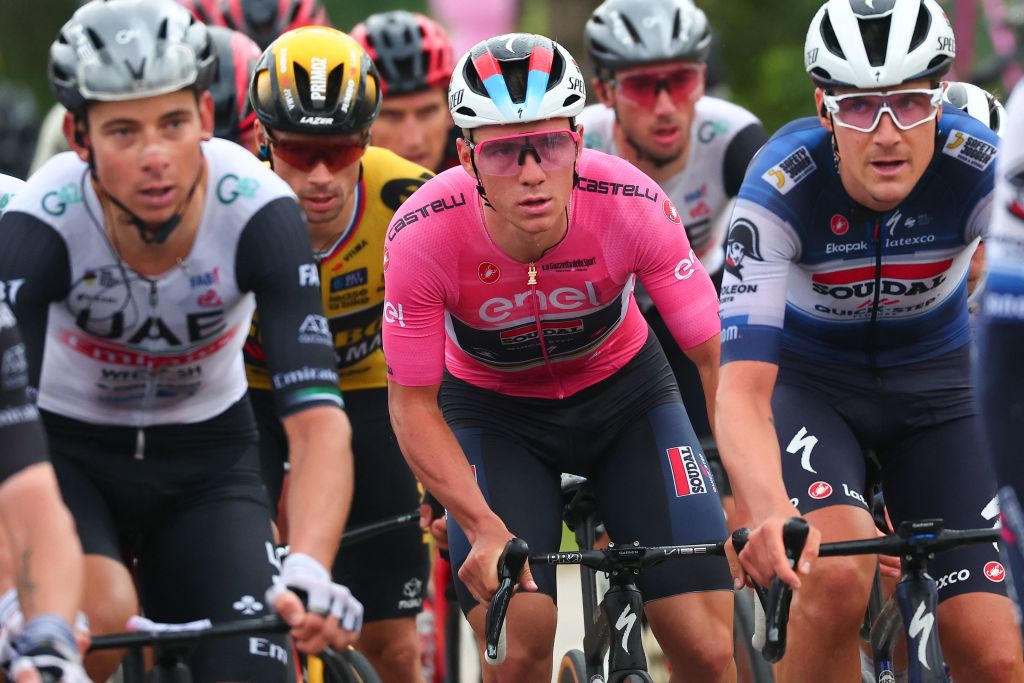Remco Evenepoel loses Giro d'Italia lead but not as smoothly as planned - Analysis
Isolation on final climb raises concerns over strength of Soudal-Quickstep

In the end, Remco Evenepoel got more or less what he wanted from the first mountain rendezvous of the Giro d'Italia by conceding the pink jersey to the breakaway at Lago Laceno, but the manner in which it was achieved left something to be desired.
Evenepoel, of course, looked as comfortable as ever on the climb of the Colle Molella, but his isolation in the finale of stage 4 will surely be a concern. He crossed the line in a group of 24 that featured five riders from Ineos and three from Jumbo-Visma – but none from Soudal-QuickStep other than the world champion himself.
In the immediate aftermath of the stage, directeur sportif Klaas Lodewyck downplayed the absence of teammates by Evenepoel's side, pointing out that he could have covered any attacks by himself in the closing kilometres. Perhaps, but in a race of three weeks, it's best to avoid having to solve problems alone too often. It also hardly augurs well for his level of support on more arduous climbing days to come.
"We did a good job as a team," Lodewyck said, pointing out that his riders had already been forced to chase down attack after attack in a relentless opening two hours of racing that took the gruppo across some rugged terrain.
Some of the better climbers, like Louis Vervaeke, thus found themselves compelled to work in the valley before the Colle Molella. "The boys had already given a lot themselves," Lodewyck said. "And Remco felt very good. He could have answered the attacks by himself."
To the surprise of some in the Soudal-QuickStep camp, no such attacks materialised, with Ineos preferring to set a brisk tempo on the front of the pink jersey group rather than send riders on the offensive. Control was the byword for Geraint Thomas and Tao Geoghegan Hart, though one wonders if they missed a trick by not dispatching someone – Pavel Sivakov, perhaps – up the road to test the waters.
On the plateau that led from the top of the climb to the finish, meanwhile, Ineos rode with the vague aim of reducing the gap to the break and keeping Evenepoel in the pink jersey, though it appears that this particular game of 3D chess came as something of an afterthought. "I did ask what the time gap was because it would have been nice to have flicked him," Thomas smiled afterwards.
Get The Leadout Newsletter
The latest race content, interviews, features, reviews and expert buying guides, direct to your inbox!
Instead, the pink jersey group came home just over two minutes down on stage winner Aurélien Paret-Peintre (AG2R-Citroen), which allowed fellow escapee Andreas Leknessund (DSM) to take hold of the pink jersey, while Evenepoel drops to second, 28 seconds down.
Evenepoel's not-so-tacet intention on Tuesday was to farm the overall lead out to a rider who posed no long-term threat and whose team might prove an ally of circumstance in the coming days. Leknessund and DSM fitted that bill perfectly, and the Norwegian came with the bonus of youth. It means that Evenepoel was also relieved of the white jersey of the best young rider, which saved him a visit to the podium and the mixed zone.
"I think this will do Remco good. I think the most important thing is that he's calmly on the bus already," Lodewyck said, pointing to how Evenepoel would reach his team hotel at least two hours earlier than normal on Tuesday evening and, most likely, for the next two days.
As well as providing Evenepoel with a couple of additional hours to recover every evening, Leknessund's temporary hold on the maglia rosa should also ease some of the burden on his Soudal-QuickStep team out on the road. Positioning will be as important as ever on the run-ins to Salerno and Naples, but DSM will at least take responsibility for much of the early policing duties.
Soudal-QuickStep will have to hope that respite will allow Evenepoel's supporting cast the opportunity to regroup ahead of the next major setpiece, Friday's summit finish on the Gran Sasso d'Italia, which brings the race to an altitude of 2,135m. A relatively untested QuickStep team coped well with the rigours of defending the red jersey at last year's Vuelta a España, but they fell short on their first real examination here.
After taking a sound beating from Evenepoel in Saturday's opening time trial in Ortona, meanwhile, Thomas, Primoz Roglic et al will surely be heartened by the apparent chink in his armour that emerged on stage 4. They might view that upcoming summit finish in a different light.
Evenepoel remains way out on his own as the favourite for this Giro, of course, but the fact that he was left so alone on the first day of climbing raises questions. One way or another, Friday's visit to Campo Imperatore might provide some answers.

Barry Ryan was Head of Features at Cyclingnews. He has covered professional cycling since 2010, reporting from the Tour de France, Giro d’Italia and events from Argentina to Japan. His writing has appeared in The Independent, Procycling and Cycling Plus. He is the author of The Ascent: Sean Kelly, Stephen Roche and the Rise of Irish Cycling’s Golden Generation, published by Gill Books.